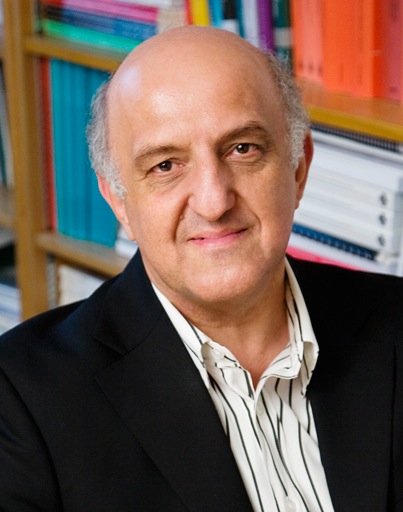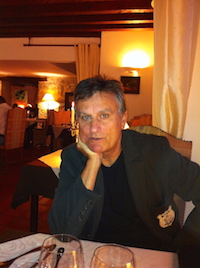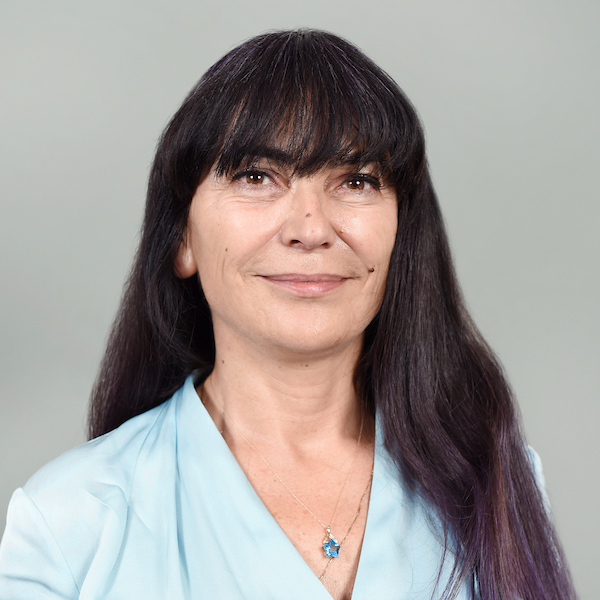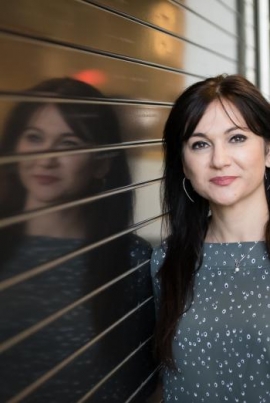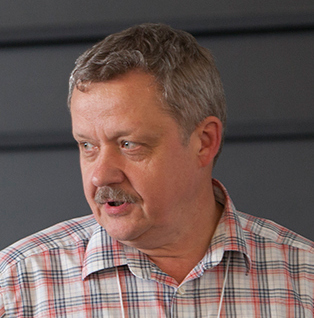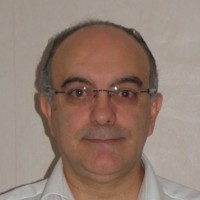|
|
|
Plenary talks
July 20, 2022
PLENARY TALK
Mean Field Games and Selected Applications
08:30 - 09:30
Tamer Başar
Swanlund Endowed Chair Emeritus and CAS Professor Emeritus of Electrical and Computer Engineering
Coordinated Science Laboratory
University of Illinois, Urbana, Illinois, 61801 USA
basar1@illinois.edu / tamerbasar.csl.illinois.edu
|
Abstract Perhaps the most challenging aspect of research on multi-agent dynamical systems, formulated as non-cooperative stochastic differential/dynamic games (SDGs) with asymmetric dynamic information structures is the presence of strategic interactions among agents, with each one developing beliefs on others in the absence of shared information. This belief generation process involves what is known as second-guessing phenomenon, which generally entails infinite recursions, thus compounding the difficulty of obtaining (and arriving at) an equilibrium. This difficulty is somewhat alleviated when there is a high population of agents (players), in which case strategic interactions at the level of each agent become much less pronounced. With some structural specifications, this leads to what is known as mean field games (MFGs), which have been the subject of intense research activity during the last fifteen years or so. This talk will provide a general overview of fundamentals of MFGs approach to decision making in multi-agent dynamical systems, discuss connections to finite-population games and how robustness features can be built into the solution process, and present selected applications drawn from a diverse set of fields, such as opinion dynamics in social networks, networked control systems, swarm formations, and demand response management in the smart grid. Biography Tamer Başar has been with University of Illinois Urbana-Champaign since 1981, where he is currently Swanlund Endowed Chair Emeritus; CAS Professor Emeritus of ECE; and Research Professor, CSL and ITI. He has served as Director of the Center for Advanced Study (2014-2020), Interim Dean of Engineering (2018), and Interim Director of the Beckman Institute (2008-2010). He is a member of the US National Academy of Engineering; Fellow of IEEE, IFAC, and SIAM; and past president of the IEEE Control Systems Society (CSS), the International Society of Dynamic Games (ISDG), and the American Automatic Control Council (AACC). He has received several awards and recognitions over the years, including the highest awards of IEEE CSS, IFAC, AACC, and ISDG, the IEEE Control Systems Technical Field Award, Wilbur Cross Medal from his alma mater Yale, and a number of international honorary doctorates and professorships. He was Editor-in-Chief of the IFAC Journal Automatica between 2004 and 2014, and is currently editor of several book series. He has contributed profusely to fields of systems, control, communications, optimization, networks, and dynamic games, and has current research interests in stochastic teams, games, and networks; multi-agent systems and learning; data-driven distributed optimization; epidemics modeling and control over networks; strategic information transmission, spread of disinformation, and deception; security and trust; energy systems; and cyber-physical systems. |
|
July 19, 2022
PLENARY TALK
Reconstructing optimal solutions to OCPs from their measure-valued optimal solutions
09:30 - 10:30
Jean-Bernard Lasserre
Directeur de recherche CNRS
LAAS-CNRS, 7 Avenue du Colonel Roche, 31031 Toulouse
lasserre@laas.fr
https://homepages.laas.fr/lasserre/
|
Abstract Measure-valued solutions to a weak formulation of optimal control problems (OCP) or certain non-linear PDEs are concerned with measures supported on the graph of optimal state- and control-trajectories (in OCP) or graph of the solution (PDEs). The moment-SOS approach which consists of a hierarchy of semidefinite relaxations of this weak formulation, provides close approximations of finitely many moments of such measure-solutions. Once such moments have been obtained, it then remains to solve the generic inverse problem of reconstructing a function from knowledge of moments of a measure supported on its graph. In some recent work [1] we have been able to provide a numerical scheme to solve this inverse problem, with some convergence guarantees when the number of moments increases. The resulting approximant, based on the Christoffel-Darboux kernel and its associated Christoffel function, is semi-algebraic and not necessarily continuous. This can explain why (at least in some numerical experiments) one avoids a usual Gibbs phenomenon encountered with more traditional approximation schemes when the function to recover is not continuous (as is typical in some OCPs and some non-linear PDEs). Finally, in a subsequent work [2] we also provide a moment-matrix completion scheme (again with some convergence guarantees) to address the case of incomplete moment information, i.e., when some moments are missing. This matrix completion scheme also consists of a hierarchy of semidefinite relaxations of increasing size and with a specific sparsity-inducing criterion. [1] Marx S., Pauwels E., Weisser T., Henrion D., Lasserre J.B. Semi-algebraic approximation using Christoffel-Darboux kernel, Constructive Approximation (2021) Biography Jean-Bernard Lasserre graduated from "Ecole Nationale Supérieure d'Informatique et Mathematiques Appliquees" (ENSIMAG) in Grenoble, then got his PhD (1978) and "Doctorat d'Etat" (1984) degrees both from Paul Sabatier University in Toulouse (France). He has been at LAAS-CNRS in Toulouse since 1980, where he is currently Directeur de Recherche éméritus. He is also a member of IMT, the Institute of Mathematics of Toulouse, and hold the "Polynomial Optimization" chair at the ANITI Institute (one of the four recently created Artificial Intelligence Institutes in France). |
|
July 19, 2022
PLENARY TALK
Socio-technological Networks and Decision Making
13:00 - 14:00
Angelia Nedich
Professor
School of Electrical, Computer and Energy Engineering
Arizona State University, Goldwater Center (GWC)
Angelia.Nedich@asu.edu
|
Abstract We will overview the role of DeGroot's opinion dynamic model for learning and decision making in a system of agents communicating over a network. We start with the classical DeGroot model and, then, use it as the main mechanism for solving optimization problems and games on networks. We then consider DeGroot's model in presence of malicious agents and consider a trust-based approach for reaching an agreement among legitimate agents via statistical learning. Biography Angelia Nedich has a Ph.D. from Moscow State University, Moscow, Russia, in Computational Mathematics and Mathematical Physics (1994), and a Ph.D. from Massachusetts Institute of Technology, Cambridge, USA, in Electrical and Computer Science Engineering (2002). She has worked as a senior engineer in BAE Systems North America, Advanced Information Technology Division at Burlington, MA. Currently, she is a faculty member of the school of Electrical, Computer, and Energy Engineering at Arizona State University at Tempe. Prior to joining Arizona State University, she has been a Willard Scholar faculty member at the University of Illinois at Urbana-Champaign. She is a recipient (jointly with her co-authors) of the Best Paper Award at the Winter Simulation Conference 2013 and the Best Paper Award at the International Symposium on Modeling and Optimization in Mobile, Ad Hoc, and Wireless Networks (WiOpt) 2015. Her general research interest is in optimization, large-scale complex systems dynamics, variational inequalities, and games. |
|
July 21, 2022
PLENARY TALK
Modeling and Control of Lithium-ion Battery Systems
14:30 - 15:30
Simona Onori
Assistant Professor
Stanford University
|
Abstract Lithium-ion battery technology has enabled electrification of the transportation sector and is projected to dominate the grid-storage in the coming years. Lithium-ion battery systems require sophisticated battery management systems (BMS) to ensure proper charging and discharging and optimize safety and performance through advanced monitoring of critical variables. In this talk, we present recent research on modeling, estimation and optimization of lithium-ion BMS from the Stanford Energy Control Laboratory at Stanford University. In the first part of the talk, we discuss practical identification of electrochemical battery models followed by the description of a degradation model based on capacity and power fade relation. We then introduce the electrode-based interconnected adaptive observer scheme for state of charge (SOC) and state of health (SOH) estimation. Nonlinear observability analysis shows that the new estimation framework outperforms the traditional one – based on battery voltage measurement only- for different current excitations and battery chemistry. In the second part of the talk, we focus on battery pack optimization. Specifically, we present a multi-objective optimization strategy developed to extend battery life while accounting for intrinsic heterogeneity in the parameters of the cells within the pack. Finally, we conclude the talk by providing an overview of research efforts currently done in our group to tackle health estimation and life prediction of second-life battery applications. Biography Dr. Simona Onori is an Assistant Professor in Energy Resources Engineering at Stanford University where she also holds a courtesy appointment in Electrical Engineering. Upon joining the Stanford faculty, she funded and currently directs the Stanford Energy Control lab where she leads a team of graduate/undergraduate students, postdocs and international visiting scholars conducting research on experiments, modeling, control and optimization algorithms of energy storage and conversation systems for transportation and grid-storage applications. She is the recipient of the 2020 U.S. DoE Clean Energy Education & Empowerment (C3E) Award, Category Research, the 2019 Board of Trustees Award for Excellence, Clemson University, the 2018 Global Innovation Contest Award by LG Chem, the 2018 SAE Ralph R. Teetor Educational Award and the 2017 NSF CAREER award. She is Editor in Chief of the SAE International Journal of Electrified Vehicles, a distinguished lecturer for the IEEE Vehicular Technology Society (2020-2022) and IEEE Senior Member (2015). She is serving as a technical advisory of a number of battery start-ups and she consults for major companies on the topic of BMS. She earned a Laurea Degree in Electrical and Computer Engineering from University of Rome “Tor Vergata”, an M.S. in Electrical Engineering from University of New Mexico, and a PhD. in Control Engineering from University of Rome “Tor Vergata”. Prior to joining Stanford University, she was a faculty at Clemson University International Center of Automotive Research and before that research scientist at the Ohio State University. |
|
July 22, 2022
PLENARY TALK
Feedback design in control as optimization problem
08:30 - 09:30
Boris Polyak
Chief Researcher
Institute for Control Sciences, Russian Academy of Sciences
|
Abstract We can consider feedback gain in linear control systems as an independent matrix variable in the related unconstrained optimization problem. Such approach becomes highly popular in recent researches. We focus on properties of the arising performance functions (smoothness, convexity, connectedness of sublevel sets, gradient domination property) and provide gradient-like methods for optimization. The following examples are addressed: linear quadratic regulator; static output feedback; design of low-order controllers, peak-to-peak gain minimization. Numerical examples confirm the advantages of the approach. Biography Boris T. Polyak received Ph.D. degree in mathematics from Moscow State University in 1963 and Doctor of Science degree in engineering from Institute for Control Science, Moscow, in 1977. He has been Head of Ya. Z. Tsypkin Laboratory, Institute for Control Science of Russian Academy of Sciences, Moscow, Russia (where he is currently Chief Researcher) and Professor of Moscow University of Physics and Engineering. He is the author of more than 250 papers in peer-review journals and 4 monographs, including Introduction to Optimization, Russian and English editions, and Robust Stability and Control, coauthored with P. S. Scherbakov. He is IFAC Fellow, recipient of EURO-2012 Gold Medal and INFORMS Optimization Society Khyachyan Prize (2021). |
|
July 21, 2022
CentraleSupelec Foundation's KEYNOTE
New perspectives for higher-order methods in Convex Optimization
08:30 - 09:30
Yurii Nesterov
CORE/INMA
UCLouvain, Belgium
|
Abstract In the recent years, the most important developments in Optimization were related to clarification of abilities of the higher-order methods. These schemes have potentially much higher rate of convergence as compared to the lower-order methods. However, the possibility of their implementation in the form of practically efficient algorithms was questionable during decades. In this talk we discuss different possibilities for advancing in this direction, which avoid all standard fears on tensor methods (memory requirements, complexity of computing the tensor components, etc.). Moreover, in this way we get the new second-order methods with memory, which converge provably faster than the conventional upper limits provided by the Complexity Theory. Biography Yurii Nesterov is a professor at Center for Operations Research and Econometrics (CORE) in Catholic University of Louvain (UCL), Belgium. He received Ph.D. degree (Applied Mathematics) in 1984 at Institute of Control Sciences, Moscow. Starting from 1993 he works at Center of Operations Research and Econometrics (Catholic University of Louvain, Belgium). His research interests are related to complexity issues and efficient methods for solving various optimization problems. The main results are obtained in Convex Optimization. He is an author of 6 monographs and more than 120 refereed papers in the leading optimization journals. He got several international prizes and recognitions, among them there are :
|
|
July 20, 2022
Invited industrial talk
How to effectively evaluate the stability of large power systems, including short-term stochastic behaviors
11:00 - 12:00
Patrick Panciatici
Scientific Advisor at RTE (French TSO)
|
Abstract Stability assessment of large power systems is usually performed using time domain simulation. Numerical schemes have been developed in the last decades, based on hybrid DAE solvers (with switches) using a predictor-corrector approach (typically IDA from sundials: IDA | Computing (llnl.gov)). They are quite efficient in the deterministic case. But in fact, there are always short-term stochastic effects in large power systems that are neglected in this type of stability assessment, Unfortunately, the deterministic approach does not verify that these stochastic effects do not excite instabilities and our classical predictor-corrector approach seems incompatible with noise addition. In the presentation, we will present an example and a formulation of the problem. Biography Patrick Panciatici is a graduate of Supélec. He joined EDF R&D in 1985 and then RTE in 2003 when he participated in the creation of an internal R&D department at RTE. He has more than 35 years of experience in power systems: modeling, simulation, control and optimization. Currently, as a scientific advisor, he inspires and coordinates RTE's long-term research on the "system" dimension. He interacts with a large network of international experts and with academic teams worldwide on these topics. He is a member of CIGRE, Fellow of IEEE, RTE representative in PSERC and Bits & Watts. |
|
Check out the PLENARY TALKS of the next ICDEA 2022 held at the same time in the same location.
